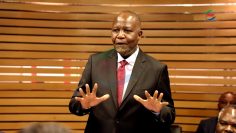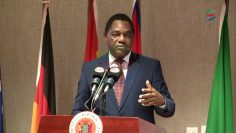
Trump renews push for Africa’s $4 billion regional rail corridor despite rising tariff tensions
(Business Insider )The U.S. decision to continue supporting the rail line—commonly known as the Lobito Corridor—signals a renewed commitment to strategic infrastructure development in Africa, even as global tariff tensions continue to escalate.
The confirmation came from a senior U.S. diplomat, indicating President Trump’s decision to continue with the project initially launched under his predecessor, Joe Biden.
The rail initiative, which has faced its share of political scrutiny and logistical hurdles, is now being repositioned as a cornerstone of U.S.- Africa economic engagement.
Originally launched as the Biden administration’s key effort in Africa, the $4 billion project appears to have the Trump team’s backing too, especially for its strategic mineral resources.
According to the BBC, the U.S. chargé d’affaires and acting ambassador to Angola, James Story, told reporters that the United States is “set to show our commitment to these projects.”
He added that Washington will continue “working with our partners to bring the project to fruition,” indicating the administration’s intention to stay the course despite broader geopolitical uncertainties.
The Lobito Corridor project
The Lobito Corridor project is one of the most ambitious rail initiatives in Africa, seen as a key effort to counterbalance China’s growing influence in the region.
Spanning across three African countries—Angola, Zambia, and the Democratic Republic of Congo (DRC)—the corridor is viewed as a crucial component of Africa’s regional integration strategy.
The rail route will provide a direct trade link between Central Africa’s mineral-rich regions and the Atlantic coast, facilitating the transportation of vital metals such as copper and cobalt, which are critical for industries like electric vehicles and artificial intelligence data centers.
The Lobito Corridor involves constructing an 800-kilometer rail line that will connect Angola’s Benguela Railway to Zambia’s Chingola Rail Line.








